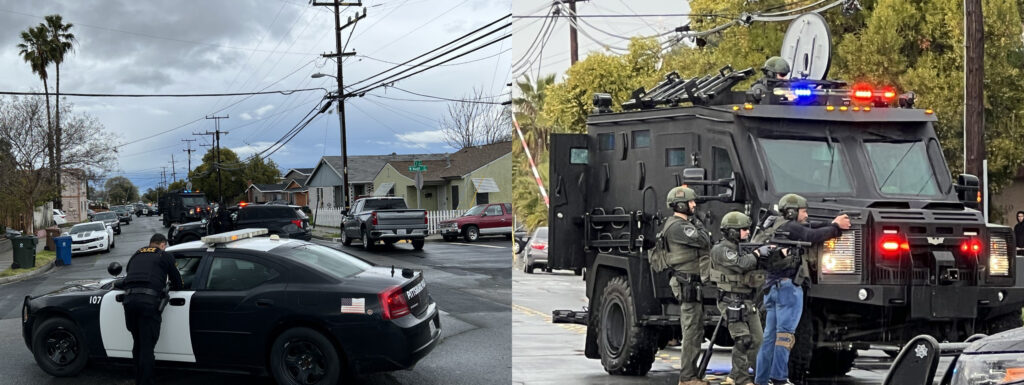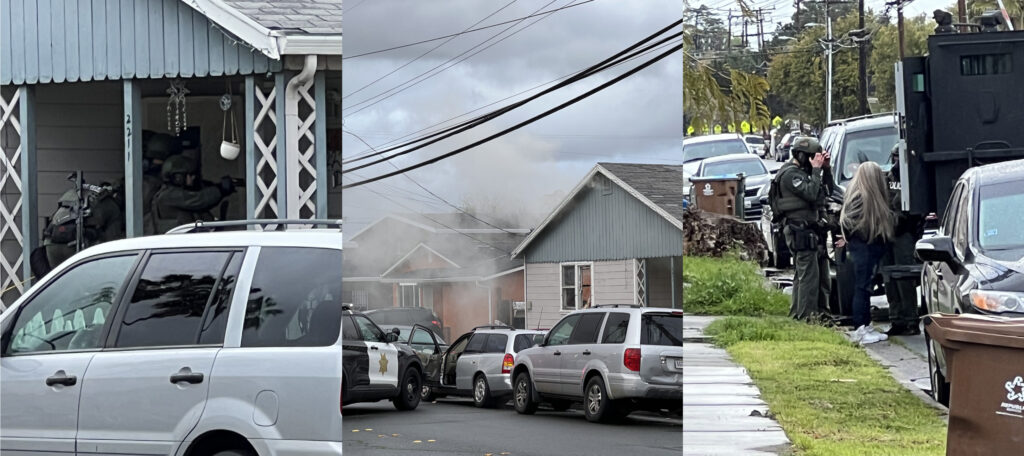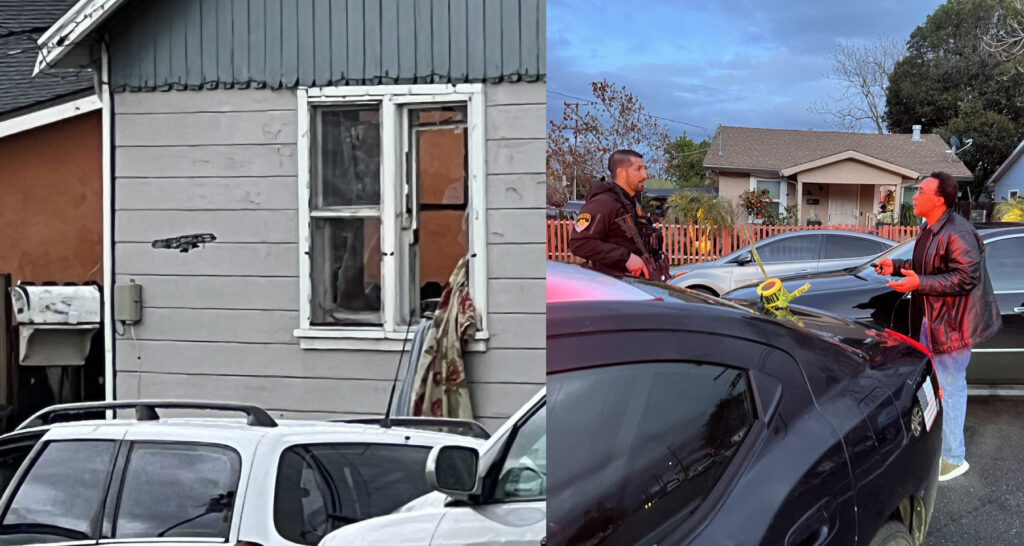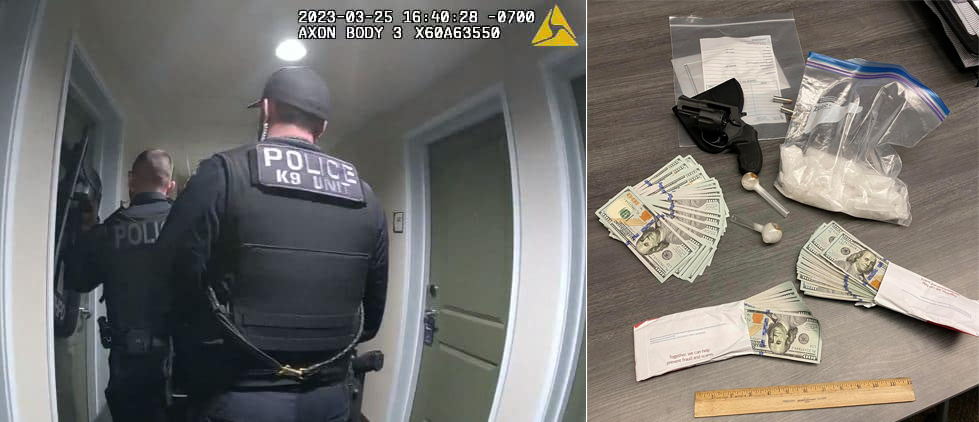
Jessica Russo was arrested by Pittsburg Police in Antioch on Wednesday, March 29, 2023. Photos of scene by Allen D. Payton. Gregory Rossignon is still wanted for the March 22 murder.
Following hours-long stand-off outside home male suspect still wanted; his father says female suspect pregnant with male suspect’s child
By Allen D. Payton
Shortly after 2:00 pm Wednesday, March 29, 2023, the Pittsburg Police Department’s Special Response Unit served a search warrant at a residence in the 2000 block of D Street in the city of Antioch for two suspects wanted for murder of a Pittsburg convenience store clerk on March 22. During the service of the warrant, Jessica Russo was located and arrested. She was booked and taken to the Martinez Detention Facility.

Pittsburg Police officers near the house on D and W. Madill Streets in Antioch. Members of the Pittsburg Special Response Unit with the department’s Bearcat armored vehicle.
After a methodical and exhaustive search of the residence was conducted, Gregory Rossignon remains outstanding and still wanted for murder. During the search officers approached the house and several times, broke windows, dropped a phone with a phone line into the house, called out on the loudspeaker for Rossignon to pick up the phone and dial a number to speak to police. The officers flew drones inside and outside and deployed four rounds of a chemical agent believed to be tear gas inside the home. After the second round of gas another woman emerged from the residence about 5:53 p.m. and was detained, placed in handcuffs and escorted from the scene.

Pittsburg officers at front door breaking out windows, tear gas smoke emerged from the house’s attic, and a second woman was detained.
About 7:35 p.m., Rossignon’s father, who identified himself as Gregory, Sr., arrived on the scene and asked to speak to his son “so everyone comes out of this alive”. He referred to Russo as his daughter. When shown a photo of Russo and asked if she was who he was referring to, Rossignon, Sr. said, “yes, I call her my daughter. She’s pregnant with my son’s child…my grandchild.” He told police, “I’ll strip down if you need me to and walk in there to talk to my son.” Later, a woman drove up to the scene and told officers she was the suspect’s mother. Officers took both parents to an area on Lawton Street where they waited but did not speak to their son.

A drone was sent into the house through windows police had broken out. Gregory Rossignon, Sr., the suspect’s father, arrived on the scene offering to speak to his son.
At about 9:15 p.m., an officer said he expected to wrap things up shortly, but that they had not had any contact with the suspect nor could confirm that anyone was still in the house.
The Pittsburg Police would like to thank the Antioch residents who live in this area for their patience during the service of the warrant. Several residents were escorted by police to their homes on D Street. But one mother and daughter who live next door to the house had to find somewhere else to stay for the night. Although offered to stay at a Pittsburg motel by one of the officers, they chose to stay with friends. The woman said she expected to return to her home Thursday morning.
The Pittsburg Police Department is asking anyone with information related to Gregory Rossingnon’s whereabouts to contact the local police. We are also asking anyone with information contact Detective Jonathan Elmore at 925-252-4875 or the Pittsburg Police Department Tip Line at 925-252-4040.
See more photos and video at facebook.com/antiochheraldca.
Allen D. Payton contributed to this report.
Read MoreArrested for sex crimes against minors in Contra Costa
By Ted Asregadoo, PIO, Contra Costa District Attorney’s Office
As the seven-count felony case against Christopher George Miller continues in Superior Court in Martinez, the investigative team who arrested him in a sting operation for arranging to engage in sex acts with a minor are asking the public for help.
The investigation into Miller started in 2022 when he was employed at Deer Valley High School in Antioch as a campus supervisor. A parent of a student reported to school officials that Miller was sending inappropriate texts to the student regarding marijuana use at the school, as well as sexually suggestive messages. (See related article)
The Contra Costa County Internet Crimes Against Children Task Force (ICAC) adopted the case about three weeks ago to see if Miller (who was then a former employee at the high school) would sell marijuana and arrange to meet for sex. Posing as a 13-year-old girl on a chat app Miller used, a Detective with the Contra Costa County Sheriff’s Office started communicating with him. At one point while exchanging texts, Miller offered to sell the fictitious teen marijuana — and later the chats became more sexual in nature.
Miller arranged to meet the teen for sex at a park in Martinez on March 16th, 2023. Participating ICAC members from the Sheriff’s Office, Concord Police, Danville Police, Pittsburg Police, and the District Attorney’s Office met him at the park and arrested Miller on marijuana possession with the intent to sell to a minor and other charges related to contacting and arranging to engage in lewd and lascivious acts with a minor. He was booked into the Martinez Detention Facility and arraigned on a total of seven felony charges on March 21st. His preliminary hearing is set for April 3rd at 8:30 am in Department 25 in Martinez.
According to the charging document filed on March 20 by the CCDA’s Office, Miller was charged with seven felonies, including P0288.3(a), Contact with Minor for Sexual Offense on or about June 14, 2022; PC288.4(b), Meeting Minor for Lewd Purposes between March 10 and 16, 2023; PC288.3(a), Contact with Minor for Sexual Offense on or between March 10 and 16, 2023; PC288.2(a)(2), Distributing Or Showing Pornography To A Minor on or about March 14, 2023; PC288.2(a)(2), Distributing Or Showing Pornography To A Minor on or about March 15, 2023; PC 664/PC288(a), Attempted Lewd Act Upon A Child on or about March 16, 2023; PC 664/HS11360(a), Attempted Sale/Offer To Sell/Transportation Of Marijuana on or about March 16, 2023.
ICAC Senior Inspector Darryl Holcombe notes that Miller may have been in contact with other victims. He’s asking the public to email him at the District Attorney’s Office if they have information related to Miller’s case. He can be reached at: DHolcombe@contracostada.org.
Case No. 01-23-00820 | The People of the State of California v. Miller, Christopher George
Allen D. Payton contributed to this report.
Read MoreEl Condado de Contra Costa Examina a la Comunidad para Planificación de las Artes y la Cultura
By Kristi Jourdan, Office of Communications & Media
What is the future of Contra Costa County’s arts and cultural landscape? As part of the County’s efforts to develop an Arts and Culture Strategic Plan, a survey will be available to residents during the month of April to gather community feedback.
The County has contracted with Arts Orange County as Project Manager to lead the arts and culture planning process. The goal is to guide an arts and cultural planning effort through an inclusive community engagement process that recognizes and respects the geographic and demographic diversity of the County. The process also includes an inventory of the County’s arts and cultural assets, including organizations, venues, and public art.
The survey will be open until April 30, 2023. To participate, visit www.surveymonkey.com/r/NSMSL2B
A Spanish language version of the survey is available at www.surveymonkey.com/r/YJHCQDH
¿Cuál es el futuro del panorama artístico y cultural del Condado de Contra Costa? Como parte de los esfuerzos del Condado para desarrollar un Plan Estratégico de Arte y Cultura, una encuesta estará disponible para los residentes durante el mes de Abril para recopilar comentarios de la comunidad.
El Condado ha contratado a Arts Orange County como Gerente de Proyecto para dirigir el proceso de planificación de las artes y la cultura. El objetivo es guiar un esfuerzo de planificación artística y cultural a través de un proceso inclusivo de participación comunitaria que reconozca y respete la diversidad geográfica y demográfica del Condado. El proceso también incluyeun inventario de los bienes artísticos y culturales del Condado, incluidas organizaciones, lugares y arte público.
La encuesta estará abierta hasta el 30 de Abril de 2023. Para participar, visite www.surveymonkey.com/r/NSMSL2B Una versión en Español de la encuesta está disponible en www.surveymonkey.com/r/YJHCQDH
Read More
 By Joe Guzzardi, Project for Immigration Reform
By Joe Guzzardi, Project for Immigration Reform
Within less than 72-hours, President Joe Biden bailed out the Silicon Valley Bank and the equally insolvent Signature Bank. The banks’ abrupt failures caused a withdrawal rush on other banks across the nation that Social Science Research Network analysts fear could force nearly 200 depositories to shut their doors. Even insured depositors – those with $250,000 or less in the bank – could have problems withdrawing their cash if these institutions faced the same run-on cash that Silicon Valley experienced a week ago.
The hastily contrived plan included providing SVB’s depositors with access to all their funds, effectively averting painful financial uncertainty and the threat of heavy losses for thousands of venture-backed startups. Signature Bank, which had followed SVB into insolvency, received the same guarantee.
More important, the Federal Reserve will provide a massive lifeline to the nation’s banks that would assure that similarly reckless lenders have access to funds that would keep them afloat and, hopefully, subdue any growing nationwide panic. Biden has since called for Congress to impose stiff penalties on executives at mid-sized banks whose ineptitude leads to bank collapse.
In short, the administration’s bailout plan handed SVB a blank check to cover all its depositors who not coincidentally are mainly Bay Area venture capitalists, Biden’s donor and voter base. All accounts are now covered with FDIC insurance, even those above the $250,000 limit. S&P Global, which provides intelligence and assessments to worldwide corporations, found that tech companies had $151.6 billion in uninsured deposits at SVB, or 93.9 percent of the company’s total holdings.
The SVB fallout has been headlines since Day One; the story is evolving. But, behind the scenes, the Biden administration is working feverishly to grant more favors to his tech pals. The tech industry, led by Lyft, Meta, Twitter and Amazon, has fired at least 150,000 workers. Among those laid off were foreign workers in the U.S. on temporary H-1B visas. The visa allows for a grace period of up to 60 days for those laid off to find another employer sponsor or they must return home. Before coming to the U.S., each H-1B visa employee knew and agreed to the guidelines which included the possibility that, if laid off and unable to find another job, they would have to leave.
Suddenly, however, the H-1B visa’s reasonable conditions are unfair and unacceptable. Led by Biden’s 25-member Advisory Commission on Asian Americans, Native Hawaiians and Pacific Islanders, lobbying to extend the job search period from 60 to 180 days has intensified. The Immigration and Citizenship Status Subcommittee’s final recommendations included not only extending the 60-day time allotment, but also granting the foreign nationals employment authorization documents (EAD), and travel permits to those who have approved I-40 employment documents in the E-1, E-2 and E-3 categories, and have waited in the immigrant visa backlog for five years, regardless of whether they’re able to file for adjustment of status applications.
To have meaning, immigration laws must be adhered to, enforced and not changed to satisfy the whims of special interests. Distributing EADs, mostly to Indians, before green cards become available would incentivize more foreign nationals to flood the immigration sponsorship program and increase the years-long backlog.
The tech layoff – with more to come – should provide employment opportunities for U.S. workers, displaced or denied opportunities for more than three decades since Congress created the H-1B visa in the Immigration Act of 1990. Instead, U.S. tech jobseekers will have to compete with the recent 85,000 H-1B visa winners in the just-completed 2023 lottery, and the recipients of the administration’s pending green card giveaway largess.
Consistent with its open border policy that puts migrants first, the Biden administration ignores U.S. tech workers’ needs and protects legally deportable aliens even though settled immigration law calls for their removal.
Big tech’s insistence that it needs an ever-higher H-1B total has always been suspect. But this year, with massive industry layoffs, the lottery should have been canceled. Furthermore, circumventing immigration laws to create more loopholes for fired H-1Bs, as the expansion lobby is doing, is indefensible.
ABOUT JOE GUZZARDI
Joe Guzzardi is a nationally syndicated newspaper columnist who writes about immigration and related social issues. Joe joined Project for Immigration Reform in 2018 as an analyst after a ten-year career directing media relations for Californians for Population Stabilization, where he also was a Senior Writing Fellow. A native Californian, Joe now lives in Pennsylvania.
Read More
Being held on $1.32 million bail
By Ted Asregadoo, PIO, Contra Costa District Attorney’s Office
Murder charges are part of a six-count felony complaint filed today by the Contra Costa District Attorney’s Office against 20-year-old Ralph Ellsworth White, III of Vallejo (born Feb. 11, 2003). The charges stem from a short high-speed police pursuit that resulted in a vehicle collision that took the life of a mother and son in Rodeo. (See related article)
The incident occurred on March 23rd around 7:30 pm when Hercules Police were notified by the Contra Costa Sheriff’s Office of a stolen Mazda SUV traveling eastbound on I-80 toward the City of Hercules. A peace officer with Hercules Police saw the stolen vehicle exit Willow Avenue and attempted to pull the vehicle over. White accelerated the SUV away from the police vehicle, and shortly after, collided with another vehicle near Parker Avenue and 4th Street in Rodeo. White fled from the crash on foot, but officers found him at a nearby liquor store. He was placed under arrest and booked into the Martinez Detention Facility in Martinez.
The impact of the collision killed the driver of the vehicle, 31-year-old Ryniqueka Dowell, and injured her six-year-old twin sons – one of whom died on March 27th from crash-related injuries. The other boy suffered a broken leg and other injuries.
According to the Contra Costa Sheriff’s Office, White is being held on $1.32 million bail in the Martinez Detention Facility, as of Tuesday, March 28, 2023.
White will be arraigned on March 29th at 1:30 pm in Martinez on the following charges: Two counts of murder with two enhancements for committing the offenses while on bail. White also faces felonies for fleeing a pursuing peace officer’s vehicle and causing serious bodily injury, a hit and run resulting in the death or injury to another person, carrying a loaded unregistered firearm, and receiving stolen property (i.e., a motor vehicle).
Case No. 02-23-00447 | The People of the State of California v. White, Ralph Ellsworth, III
Allen D. Payton contributed to this report.
Read More
After April 3 state order expires
Staff in local skilled nursing facilities (SNFs) will be required to continue wearing masks under a new Contra Costa County health order.
The order, which requires masks to be well-fitted and cover the nose and mouth, will also apply to paramedics, emergency medical technicians, contractors and vendors when they enter these facilities in Contra Costa. The masking order will not apply to SNF patients or visitors seeing their loved ones.
The County’s health order will go into effect on Monday, April 3, immediately after the state’s COVID masking order for healthcare settings expires.
“Requiring staff at SNFs to wear well-fitting masks will help protect their vulnerable elderly patients from being infected with COVID,” said Dr. Ori Tzvieli, the County’s health officer, who is issuing the order. “We know from our experience during the pandemic that the people SNFs serve – seniors with serious underlying health problems – are the ones who are most susceptible to severe outcomes from a COVID infection.”
Since the pandemic began in 2020, 57% of the deaths from COVID in Contra Costa have been among people ages 75 and older.
There are 30 SNFs in Contra Costa. Skilled nursing facilities provide a higher level of medical care than other long-term care facilities. The order will not apply to assisted living facilities, residential-care facilities or board-and-care homes, although masking is still highly recommended in those settings.
Hospitals and outpatient healthcare clinics in Contra Costa County will not be subject to the new County order, although local health systems can choose to enforce their own masking policies. Dr. Tzvieli said hospitals have robust infection-control policies and personnel and can determine if and when masking is required.
California’s pandemic-related health emergency ended on Feb. 28. While the state is lifting its masking requirements for healthcare settings on April 3, local health officials can still issue their own masking orders.
Under the County health order, a well-fitted mask is defined as covering the nose and mouth and it’s strongly recommended that SNF personnel use higher-quality masks, such as an N95 or KN95/94, to provide the maximum protection.
County health staff were asked why the order is still necessary when there has been less than a 1% infection rate in the county in the past 60 days and according to a physician at John Muir Medical Center Concord, the latest COVID strain is treated like a bad cold and they no longer hospitalize for it.
UPDATE: According to Contra Costa Health spokesman Will Harper, “The new local order is narrowly focused on skilled nursing facilities and not any other settings. We are focusing on SNFs in this order because they are where we have seen some of the worst impacts of COVID in Contra Costa County, and we are being cautious with removing one of the last major layers of protection in this setting. As we said in the press release, requiring staff in skilled nursing facilities to wear masks will help protect the vulnerable elderly patients they serve.
From March 2020 to August 2022, deaths of residents of skilled nursing facilities accounted for approximately 27% of all deaths from COVID in the County and, looking more broadly, since the start of the pandemic, 57% of the deaths from COVID in Contra Costa have been among people ages 75 and older.”
Allen D. Payton contributed to this report.
Read More
Third suspect arrested; GoFundMe page set up for 44-year-old father of five victim
By Pittsburg Police Department
On Wednesday, March 22, 2023, shortly after 9:00 PM, Pittsburg Police Officers responded to a residence on the 100 block of Bruno Avenue after receiving reports of gunshots heard. While on scene and attempting to determine what had occurred, officers heard gunshots coming from the 1000 block of Power Avenue. Shortly after, a call was received that a clerk had been shot at a convenience store on Power Avenue. At 9:41 PM, officers responded to the 1000 block of Power Avenue. Officers arrived on scene and found a male subject had been shot. Officers provided medical aid, but unfortunately the victim succumbed to his injuries on scene.
Through the investigation, it was learned that 37-year-old Gregory Rossignon and 34-year-old Jessica Russo, both from Pittsburg, were involved in an altercation on Bruno Avenue. During this time, several shots from a handgun were fired into the air. No one was injured as a result, and both immediately fled the area. As officers investigated this incident, additional officers responded to the convenience store.
There, officers found and began life-saving efforts on the clerk who had been shot. Unfortunately, the clerk, 44-year-old Abdul Raouf, did not survive these injuries. During the investigation at the convenience store, it was determined that Gregory Rossignon and Jessica Russo were involved in this fatal incident after a confrontation with the store employees. Following the shooting, both fled from the store. Additionally, another man was identified as having been involved in this incident and later arrested at a residence in Pittsburg. This man was identified as 43-year-old Alan Agloro from Pittsburg.
Detectives have obtained arrest warrants for Gregory Rossignon and Jessica Russo and are asking anyone with information on their whereabouts to contact the local police.
This is still an active investigation, and we ask anyone with information about these two incidents to contact Detective Elmore at 925-252-4875 or the Pittsburg Police Department Tip Line at 925-252-4040. This is Pittsburg’s first homicide for the year 2023.
A GoFundMe page has been set up for Raouf’s wife and five children.
Read More
During police chase; suspect arrested, expected to face murder charges
By Hercules Police Department
On March 23, 2023, at about 7:27 pm, the Hercules Police Department received information from the Contra Costa County Sheriff’s Office regarding a stolen 2021 Mazda SUV, possibly heading toward the City of Hercules on eastbound I-80. A Hercules Police Officer saw the Mazda exit I-80 eastbound onto northbound Willow Avenue. As the Officer caught up to the Mazda, the driver immediately began to accelerate. The Officer initiated a short pursuit of the SUV, before it collided into a 2017 Nissan passenger vehicle in the area of Parker Avenue and 4th Street in the City of Rodeo. The driver of the Mazda immediately got out of the vehicle and ran northbound onto Parker Ave. A perimeter was established, and the suspect was found, at a nearby liquor store. He was placed under arrest, and later transported to the Martinez Detention Facility.
The driver of the Nissan passenger vehicle was a 31-year-old, mother of twin boys, age six. All were inside the vehicle and sadly, the mother passed away at the scene. The children were taken to Children’s Hospital in Oakland. One of the boys was in critical condition. He unfortunately passed away.
We will be filing the case with the Contra Costa County District Attorney’s office tomorrow, Tuesday, March 28, and we will be seeking additional murder charges.
This incident is still an active investigation, and any additional information will be released as the investigation continues. Anybody with any additional information is encouraged to contact Hercules Police Department at (510) 724-1111.
Our thoughts are with the family of the victims and the community during this difficult time. We ask that you please respect the family’s privacy, and that you keep them in your prayers.
According to KTVU News reporter Henry K. Lee, 20-year-old the suspect is Ralph White III and is being held on suspicion of vehicle manslaughter, auto theft and evading police. A tweet of a surveillance video shows the stolen Mazda crashing into the Nissan at 4th and Parker (Viewer discretion). In addition, according to a further tweet by Lee, a GoFundMe page has been set up for the family which identified the mother as Ryniqueka Dowell and the one son as, Jamari Humble and the surviving son as Jamani Humble.
Allen D. Payton contributed to this report.
Read More
By Pleasant Hill Police Department
Saturday afternoon, March 25, 2023, patrol officers learned a wanted subject might be associated with a room at a local hotel. The wanted subject had a warrant related to a residential burglary in Pleasant Hill. Officers safely served the warrant and arrested the subject without incident. Another person in the hotel room also had felony warrants and was on probation.
During a probation search of the hotel room, Officers uncovered a hidden firearm, nearly a pound of methamphetamine, evidence of drug sales and a large amount of cash. Both subjects were booked into county jail for multiple felonies including the warrants. The drugs, firearm and cash were all seized.
PHPD investigators will work closely with the District Attorney to review this case. We want to thank our local community for your continued support.
Read More
 The Physicians’ and Dentists’ Organization of Contra Costa (PDOCC), a labor union representing more than 240 doctors in Contra Costa County’s public health system, announced a contract agreement with county management.
The Physicians’ and Dentists’ Organization of Contra Costa (PDOCC), a labor union representing more than 240 doctors in Contra Costa County’s public health system, announced a contract agreement with county management.
The agreement was supported by 90 percent of voting PDOCC members and approved by the County Board Supervisors on Tuesday, May 21. It avoids a historic strike which would have impacted operations throughout the county health system.
The contract enhances the time doctors have to manage their panels of patients and also makes the compensation package more competitive in the Bay Area market.
The contract addresses many issues PDOCC members raised in their negotiations. During the negotiations county doctors and dentists pointed to high patient caseloads, insufficient time for administrative tasks, long waits for primary care appointments and specialty referrals, chronic short staffing and high turnover – all of which combine to negatively impact patient care and health impacts.
“Our new contract advances our goal of improving the ability of Contra Costa County to recruit and retain top medical and dental talent to best serve our communities,” said Dr. David MacDonald, PDOCC President. “We will continue advocating for the patient care issues we called attention to in our negotiations, but we are optimistic about our progress and path forward.”
Read More
























